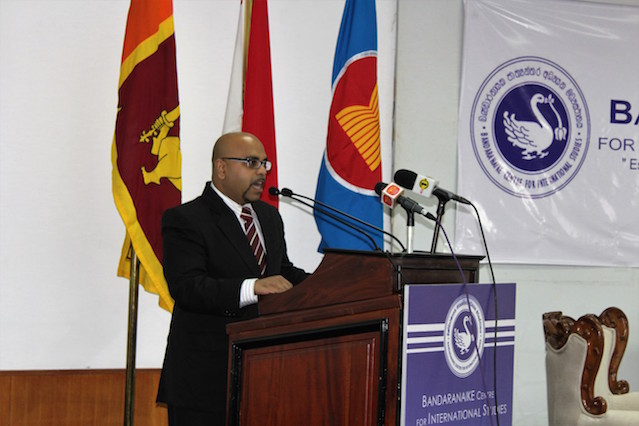A Brief Colonial History Of Ceylon(SriLanka)
Sri Lanka: One Island Two Nations
A Brief Colonial History Of Ceylon(SriLanka)
Sri Lanka: One Island Two Nations
(Full Story)
Search This Blog
Back to 500BC.
==========================
Thiranjala Weerasinghe sj.- One Island Two Nations
?????????????????????????????????????????????????Wednesday, September 28, 2016
BCIS Pipes A New Tune

In meeting the present Bandaranaike Centre for International Studies
(BCIS) Director Dr. Harinda Vidanage, ostensibly to interview him, I
have an ulterior motive. I go to judge him. The BCIS is a tertiary
educational institute offering study programmes in international
relations. BCIS programmes promise to be potential gateways to careers
in the Sri Lankan Foreign Service, foreign missions and international
organizations. Leaving aside his dynamism, energy, leadership – standard
baggage for any good administrator – how good is Harinda Vidanage’s
discernment of international relations? Could he be a good mentor to
students whose future career may involve interacting with the world to
further the interests of Sri Lanka?
Test 1 – India- Sri Lanka Bridge
As the appointee of a government whose Prime Minister is reliably
credited with numbering among his favourite projects, a land bridge
between India and Sri Lanka, how would Dr. Vidanage interpret this
issue? Would he use fancy footwork to remain elusive and non-committal
or would he stand and bite the bullet like the Southerner that he is?

“So what do you think of this bridge between India and Sri Lanka?” I
ask. “I have no idea” he retorts. Such instant evasion isn’t promising, I
think discouraged. Perhaps if one were to approach him as a woman of
the world on the subject of bridges… “I am not asking whether it’s going
to be built or not. I am asking your opinion. All these bridges, the
first time they are proposed there’ s always opposition, for example
even for the Channel Tunnel, between France and England, when it was
proposed 100 years ago, it was opposed. But eventually it was built.
Even the Korea-Japan Tunnel, it’s opposed now because of nationalistic
and xenophobic concerns, but don’t you think all these bridges will be
built eventually?”
Harinda Vidanage places his answer at a midpoint between the two
extremes that are polarizing the current debate. He doesn’t say the
bridge is bad down with the bridge, nor does he say the bridge is the
greatest thing since the World Wide Web, let’s have it. He tells me that
he is trying to answer my question in a unconventional way. His answer
has three parts.
Part one – The real issue is connectivity with India. For connectivity
with India, a bridge is not really necessary. You have enough means of
connecting these two countries already.

